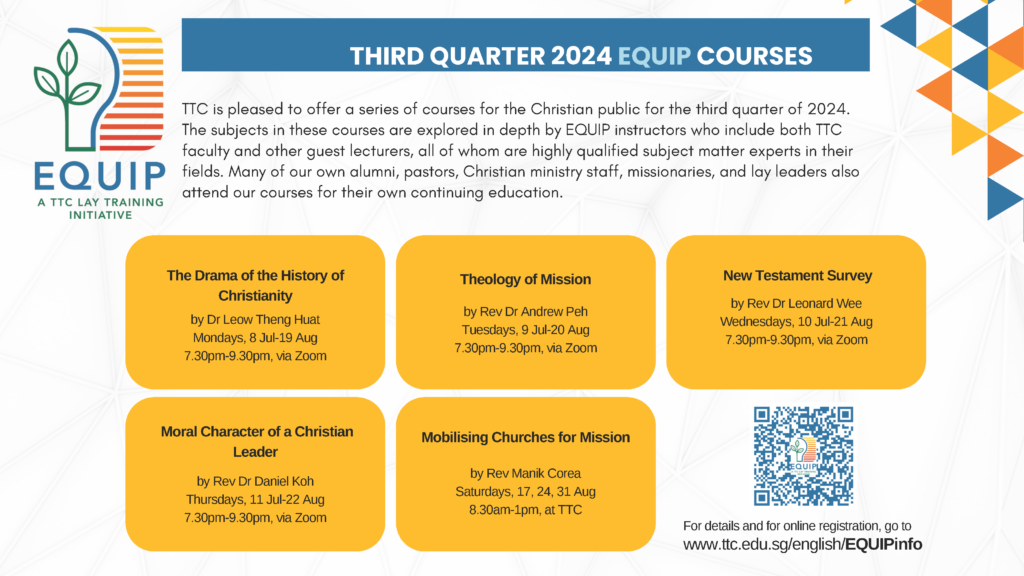The Importance Of Context For Understanding The Bible

I tell you: “Pastor Tan has always been gay …”
What do you think?
Let me continue my sentence: “… and sprightly, a very sociable person who never fails to liven up a meeting.”
Were you correct in your thought about Pastor Tan?
The word “gay” can have multiple meanings, depending on the context in which it is used. In this case, it is being used to describe Pastor Tan’s lively personality, not his sexual orientation.
Same words used in the Church and outside the Church can also convey different ideas. A minister in a Church ministry is poles apart from a minister as the head of a government ministry.
It is important to be aware of the potential dangers of misinterpreting words. When we take words out of their contexts, we can distort our understanding of the Bible and prevent ourselves from fully grasping its message.
Below are some examples of words from the Bible for illustration.
Slave
The Greek word “doulos” is translated as “slave” in the NET Bible and as “servant” in NIV:
- “From Paul, a slave of Christ Jesus, called to be an apostle …” (Rom 1:1 NET)
- “Paul, a servant of Christ Jesus, called to be an apostle …” (NIV)
Paul refers to himself as a “doulos of Christ Jesus.” In this sense, being a “doulos” is not an undesirable thing. (Think of the OM ship named “Doulos”.)
However, the word “doulos” can also be used to refer to a person who is in bondage to another person. The NT does not explicitly condemn slavery, but it does contain some passages that can be interpreted as being critical of it. For example, in Gal 3:28, Paul says that “in Christ there is neither slave nor free.” This passage has been interpreted by some as a call for the abolition of slavery.
In the early Christian period, slavery was commonplace. There were different types of slaves. Some were well-treated and became like close family members. Of course, there was also abuse by cruel slave owners. Besides, there was a difference between a bondslave and “one who is made slave.”
When we read the word “slave” in the Bible, we should understand its contextual meaning. Even in the sense that assaults our modern sensibilities, an awareness of the complex historical social milieu will be helpful to us in dealing with the question of why God allowed slavery in the first place.
Apostle
The title “apostle” refers to Christ Himself. (Heb 3:1)
It applied to the twelve disciples chosen by Christ. (Lk 6:13-16) The list of the Twelve was reconstituted with Matthias replacing Judas. (Acts 15:26) The title was restricted to the Twelve, who were regarded as the Church’s foundation. (Rev 21:24)
In Acts 14:14, Barnabas was given the title “apostle”; likewise in Rom 16:7, Andronicus and Junias. For these three, “apostle” is used in a general sense to refer to someone sent as a messenger of Christ; as in John 13:16 (NIV) – “Very truly I tell you, no servant is greater than his master, nor is a messenger [Greek: apóstolos] greater than the one who sent him.”
In Rom 1:1, Paul claimed the title “apostle” for himself. Although he was not one of the Twelve, he was nevertheless sent by Jesus Christ and God the Father. (Gal 1:1) The marks of a true apostle, including signs, wonders and miracles are mentioned in 2 Cor 12:12.
In Acts 19:11, we read that God did extraordinary miracles through Paul. We also read in 2 Cor 12:13-15 how Paul was self-sufficient in his needs and not a burden to the Corinthians.
The Greek word for “apostle” carries conceptual differences in its usages within and without the NT. Even if the term is considered appropriately used today to refer to someone who is called to a special ministry of planting churches and spreading the gospel, it does not imply full conceptual equivalence to all the apostles of the early church.
Disciple
In the NT, the term “disciple” is only used in the Gospels and Acts.
It refers to those chosen by Christ among whom the Twelve were designated as apostles. (Luke 6:13)
Here are three Bible translations of the Lord’s command (Mt 28:19):
“Therefore go and make disciples of all nations …” (NIV)
“Go ye therefore, and teach all nations …” (KJV 1900)
“So go and make followers of all people in the world …” (NCV)
It is apt to think of a disciple as a learner (with a teacher) and as a follower of Jesus who abides by His teachings on the right way of life.
Interestingly, being a learner/follower is also borne out by the Hebrew word for disciple in Isa 8:16. The same Hebrew word is rendered as “learned”, “well-instructed” or “taught” in different translations of Isa 50:4 and Isa 54:13.
The disciples were called Christians first at Antioch. (Acts 11:26) Other translations use the term “followers” or “believers” in place of “disciples”.
Thus, the term “disciples” in common usage in the Church is synonymous with “Christians”. (Acts 6:1) Christians cannot deny their discipleship status with Christ as their Great Teacher.
Conclusion
1 John 5:20 does not say that we must understand everything in order to know Jesus.
The danger is not in a lack of understanding, but in a surplus of misunderstanding.
For example, if we misunderstand the nature of God’s love, we may think that God is distant or uncaring. This misunderstanding could lead us to doubt God’s love and to give up on our faith.
Or, if we misunderstand the meaning of suffering, we may think that it is a punishment from God. This misunderstanding could lead us to despair and to lose hope.
John Lee







Responses